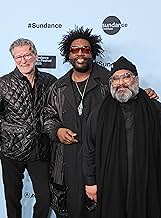Sly Lives! (aka the Burden of Black Genius)
- 2025
- 1h 52min
Si concentra sulla vita e l'eredità di Sly and the Family Stone, raccontando la storia dietro l'ascesa, il regno e la scomparsa di uno degli artisti più influenti della musica pop.Si concentra sulla vita e l'eredità di Sly and the Family Stone, raccontando la storia dietro l'ascesa, il regno e la scomparsa di uno degli artisti più influenti della musica pop.Si concentra sulla vita e l'eredità di Sly and the Family Stone, raccontando la storia dietro l'ascesa, il regno e la scomparsa di uno degli artisti più influenti della musica pop.
- Premi
- 2 candidature totali
Sly Stone
- Self - Singer, Sly & The Family Stone
- (filmato d'archivio)
Cynthia Robinson
- Self - Trumpet, Sly & The Family Stone
- (filmato d'archivio)
Recensioni in evidenza
Follows a very standard bio-doc template... rise-fall-redemption. But I really liked the thread of black genius and the pressure placed on America's very best black performers. Most of the archival interview footage with Sly Stone was really compelling. He has a very good way of expressing himself meaningfully without capitulating to the awful questions people asked him. Right at the midpoint of the film, around the time when Sly Stone's run of genius albums is about to take a darker, inward turn, there is an interview clip of Dick Cavett interviewing Stone, with Cavett being a total, well, dick. Sly's response properly shames Cavett... and all us as well.
As "Sly Lives! (aka the Burden of Black Genius)" (2025 release; 112 min) opens, talking heads are gushing about how revolutionary Sly & the Family Stone was (multi-racial! Multi-gendered! Irresistible music!). The film's director then asks prominent Black artists what they think about the burden of Black genius. We then go to "San Francisco 1964", where Sly is a well-known and beloved DJ. At this point we are 10 minutes into the documentary.
Couple of comments: this is the second documentary from musician Questlove, whose first documentary "Summer pf Love" won the Oscar for best documentary. Here the Roots drummer assesses the life and times of Sly Stone, who in the late 60s shot out of nowhere like a comet to the very top of the music world and stayed there for a couple of years, only then to fade away rather quickly. (Sly & the Family Stone also feature prominently in the "Summer of Soul" documentary.) One of THE highlights for me was to see how the song "Everyday People" evolved from a slow and quiet song in its early stages to the exuberant iconic singalong as we all know it now. The film features tons of obscure footage, as well as plenty of comments from various talking heads (including Sly's 3 children and several of his ex-es). For a couple of years, Sly & the Family Stone ruled the airwaves and the concert scene. As the movie makes clear, with Sly & the Family Stone, there likely would not be Prince & the Revolution. And without "Thank You", there would be no Janet Jackson's "Rhythm Nation". And that's just 2 examples how influential Sly has been. If you have seen "Summer of Soul", one of the finest music documentaries I have ever seen, beware that "Sly Lives!" is quite good, but not the truly gold standard that was/is "Summer of Soul".
"Sly Lives! (aka the Burden of Black Genius) premiered at this year's Sundance Film Festival to immediate acclaim. It started streaming on Hulu just last week, and I watched it the other night. This is currently rated 80% Certified Fresh on Rotten Tomatoes, a tad too generous in my book. All that aside, if you are a fan of Sly Stone, or liked "Summer of Soul", I'd readily suggest you check this out, and draw your own conclusions.
Couple of comments: this is the second documentary from musician Questlove, whose first documentary "Summer pf Love" won the Oscar for best documentary. Here the Roots drummer assesses the life and times of Sly Stone, who in the late 60s shot out of nowhere like a comet to the very top of the music world and stayed there for a couple of years, only then to fade away rather quickly. (Sly & the Family Stone also feature prominently in the "Summer of Soul" documentary.) One of THE highlights for me was to see how the song "Everyday People" evolved from a slow and quiet song in its early stages to the exuberant iconic singalong as we all know it now. The film features tons of obscure footage, as well as plenty of comments from various talking heads (including Sly's 3 children and several of his ex-es). For a couple of years, Sly & the Family Stone ruled the airwaves and the concert scene. As the movie makes clear, with Sly & the Family Stone, there likely would not be Prince & the Revolution. And without "Thank You", there would be no Janet Jackson's "Rhythm Nation". And that's just 2 examples how influential Sly has been. If you have seen "Summer of Soul", one of the finest music documentaries I have ever seen, beware that "Sly Lives!" is quite good, but not the truly gold standard that was/is "Summer of Soul".
"Sly Lives! (aka the Burden of Black Genius) premiered at this year's Sundance Film Festival to immediate acclaim. It started streaming on Hulu just last week, and I watched it the other night. This is currently rated 80% Certified Fresh on Rotten Tomatoes, a tad too generous in my book. All that aside, if you are a fan of Sly Stone, or liked "Summer of Soul", I'd readily suggest you check this out, and draw your own conclusions.
Sly Stone is an infinitely fascinating character and musician. His music will be around forever.
Qwestlove's obsession with Sly being a black genius is grating and he's projecting too much of his own outlooks instead of trying to find out and express just what Sly Stone's outlook was/is.
Most of the musicians interviewed in the doc, do not hold a candle to Sly's talent or achievements, so their opinions don't hold much weight.
The only interviews that were interesting were his band mates. And how could they not a find any of his contemporaries? How could they basically ignored his discography after Fresh? Or the quirky side projects he did.
This documentary had too much of a personal agenda that wasn't about Sly Stone. Still, the man was just that interesting that he shines through despite the negative issues.
Qwestlove's obsession with Sly being a black genius is grating and he's projecting too much of his own outlooks instead of trying to find out and express just what Sly Stone's outlook was/is.
Most of the musicians interviewed in the doc, do not hold a candle to Sly's talent or achievements, so their opinions don't hold much weight.
The only interviews that were interesting were his band mates. And how could they not a find any of his contemporaries? How could they basically ignored his discography after Fresh? Or the quirky side projects he did.
This documentary had too much of a personal agenda that wasn't about Sly Stone. Still, the man was just that interesting that he shines through despite the negative issues.
This is better than nothing of course and I must say that if it wasn't for quest love, this documentary probably wouldn't have been made. At the same time he ruined to some degree what could've been a stellar documentary. Quest love's personal theory about the burden of being a black genius, doesn't make any sense nor was it needed. Especially when you're trying to push the narrative that Sly was one of the first people to undergo it publicly as if Little Richard and James Brown and Chuck Berry didn't exist. There's a case to be made that the directors views completely contradict that of sly stone and you can clearly see that there's a clash there. I pray to God, someone comes along, and does a better documentary where Sly is telling his own story. The idea that black artists deserve to enjoy the fruits of their labor and die with their kids around them while plenty ignoring that those same black artists were irresponsible with their money and chose drugs over being responsible parents, is trick knowledge.
This is fine and will do the job as placeholder. It's in the standard format of blending clips, stills, archive footage, with contamporaries being interviewed, to take us through a famous life, the ups and downs and perhaps lessons involved.
Here it's Sly Stone, who oould have been a Prince of sorts. Theatric, multifaceted, but it was the civil rights years, and his creative life mirrors that trajectory; ebullient hope to transcend boundaries, to bitterly dashed dreams.
One lesson, and it's generally offered, is that there was no scaffold, blueprint, on which to know what to do build next, how to play the role of superstar. He, along with everybody else, had to make it up as they went along. Another talking point here is 'black' genius, the particular tolls of it in a world where boundaries are drawn starkly against you.
There may be parallels with someone like Brian Wilson; 'genius' in being able to perceive music as visual world, as shared streets you explore, but limited in the means, work, and focused commitment required to consistently bring it to life.
At least his Riot album is as important as anything from the time, a dissonant extended improvisation on previous fabric of soul music, and that as mirroring a dissonant collapsing America. It's probably a cornerstone for all black music that followed.
My own takeaway is of a man who in terms of vision was second to none of the greats of the era; adept at improvising self, savvy enough to be able to see the larger fabric.
But there's no real stage for him to move to, fails to transcend, and probably had plenty of reasons against him. The drugs were probably ways to dissociate, make believe he was what he couldn't summon. So he periodically returns as caricature of himself, clowning it for the camera, unsure how to be the next version of himself.
Meanwhile, just as he was cratering, Bronx and Harlem youths were rediscovering him in record stores, and were about to speak once more about what he used to; the world of stark limits, and yet somehow joyful dance, ironically cruising through cracks. Interestingly, the new music, hip hop, would eschew the whole band format, and pare it down to narrator and rousing, sometimes soulful breaks that suggest world.
Here it's Sly Stone, who oould have been a Prince of sorts. Theatric, multifaceted, but it was the civil rights years, and his creative life mirrors that trajectory; ebullient hope to transcend boundaries, to bitterly dashed dreams.
One lesson, and it's generally offered, is that there was no scaffold, blueprint, on which to know what to do build next, how to play the role of superstar. He, along with everybody else, had to make it up as they went along. Another talking point here is 'black' genius, the particular tolls of it in a world where boundaries are drawn starkly against you.
There may be parallels with someone like Brian Wilson; 'genius' in being able to perceive music as visual world, as shared streets you explore, but limited in the means, work, and focused commitment required to consistently bring it to life.
At least his Riot album is as important as anything from the time, a dissonant extended improvisation on previous fabric of soul music, and that as mirroring a dissonant collapsing America. It's probably a cornerstone for all black music that followed.
My own takeaway is of a man who in terms of vision was second to none of the greats of the era; adept at improvising self, savvy enough to be able to see the larger fabric.
But there's no real stage for him to move to, fails to transcend, and probably had plenty of reasons against him. The drugs were probably ways to dissociate, make believe he was what he couldn't summon. So he periodically returns as caricature of himself, clowning it for the camera, unsure how to be the next version of himself.
Meanwhile, just as he was cratering, Bronx and Harlem youths were rediscovering him in record stores, and were about to speak once more about what he used to; the world of stark limits, and yet somehow joyful dance, ironically cruising through cracks. Interestingly, the new music, hip hop, would eschew the whole band format, and pare it down to narrator and rousing, sometimes soulful breaks that suggest world.
I più visti
Accedi per valutare e creare un elenco di titoli salvati per ottenere consigli personalizzati
Dettagli
- Tempo di esecuzione1 ora 52 minuti
- Colore
- Mix di suoni
Contribuisci a questa pagina
Suggerisci una modifica o aggiungi i contenuti mancanti

Divario superiore
What is the Spanish language plot outline for Sly Lives! (aka the Burden of Black Genius) (2025)?
Rispondi





































